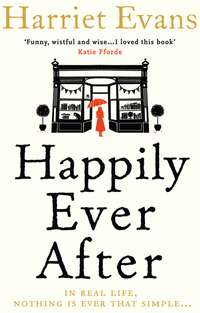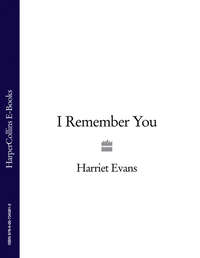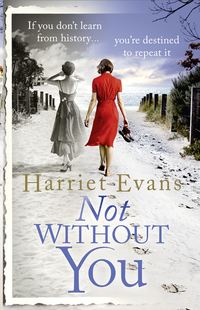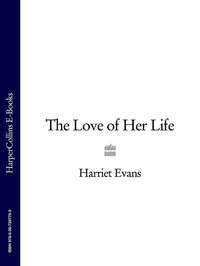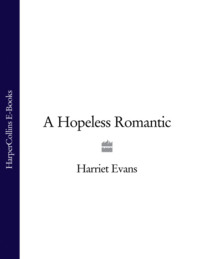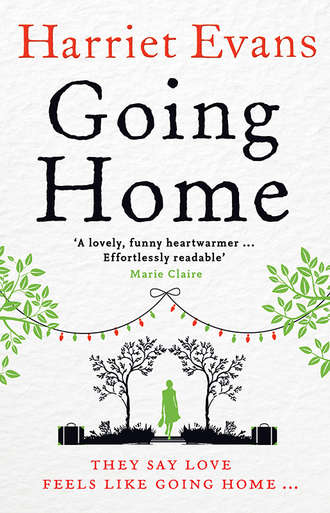
Полная версия
Going Home
TWO
It was my parents’ house, but it felt like home to all of us. The home of the Walter family. It had been for over a hundred years, pretty amazing when you think about it. My great-great-grandfather, Sir Edwin Walter, had been a successful society artist who painted Victorian ladies who lunched. Elise was the dark-eyed eighteen-year-old daughter of a paper manufacturer. They had fallen in love when he painted her. He asked her father if he could marry her, and her father said no, that Edwin was a flaky London painter without roots, living in a shambolic studio in Hampstead, of all places.
So my great-great-grandfather, who until then had never thought about anyone but himself, went looking for somewhere to settle down, and found Keeper House. The owner had just died: his family had lived there since it was built in 1592, and he was the last of the line. Just one family, for three hundred years. It was small, dilapidated, unloved and scruffy, but my great-great-grandfather looked out over the valley, at the meadows, the fields and the stream, and up into the twinkling windows, and knew immediately he would live there with Elise. When he persuaded her father to bring her down to see it, family legend has it that all three stood in the hallway and toasted Elise and Edwin’s future happiness. I’ve always loved that story.
Keeper House is built in a mellow golden stone that gleams in summer and glows in winter. It’s L-shaped, with high, leaded windows whose casements jam in wet weather, long, rambling corridors with uneven floorboards, and evil hot-water pipes that rarely work and sound like the Edinburgh Tattoo when they do. It’s a beautiful house, and we were lucky to have grown up there. It is encircled by a wall, and at the front there is a terrace of flagstones, worn smooth with age, where tiny white flowers spring up in the cracks each spring. At the back there is a long lawn and a walled garden, where rows of lavender stretch from the kitchen door, punctuated by tumbling, sweet-smelling roses, mustardy lettuce and the tastiest potatoes.
In summer it’s the best place in the world to live. In winter, it can be a nightmare: freezing, draughty, prone to break-downs and temperamental behaviour, but we never mention this out of politeness to the house – at least, I don’t. I once found Mum hugging the ancient boiler and banging her head against its red-painted curves, moaning, ‘Why do you do this to me?’
Tom took the last corner and we veered left down the driveway. Jess and I craned our necks like a couple of five-year-olds. ‘There’s Chin, and that must be Gibbo,’ Jess said. I could see them all through the big leaded bay window as Tom brought the car to a halt – Mum, mug in hand, half standing, smiling, Dad beaming as he walked towards the front door, Chin and Gibbo following him, then Kate.
They filed out one by one. ‘Hello!’ we cried. ‘Hello!’ I hugged Dad, shook hands with Gibbo and kissed Chin.
‘Darlings, you’re here!’ My mother was holding a stodgy-looking piece of cake, which she waved at us. ‘Oh, I’m so glad to see you. You made good time, didn’t you?’ She kissed me and Jess, then Tom. ‘Come inside, we’re having a Bavarian stollen I’ve made.’
Jess and Tom rolled their eyes, just as Kate appeared. ‘Hello, Tom,’ she said, and gave him the kind of hug that the Rock would have been proud of.
As we entered, the smell of home flooded over me, a potent blend of damp old flagstones, burning logs and something baking in the Aga. Then I caught the scent of the Christmas tree in the hall and the boughs of pine that were laid along the windowsills throughout the house.
‘I’ll make a fresh pot of tea,’ Mum said. ‘Why don’t you shove your bags upstairs so we don’t fall over them?’
Jess and I lugged our suitcases up the carved staircase that curved over the hall, along the galleried corridor, from which you could drop things on the heads of new arrivals, past the alcove with the worn-out rocking chair and a bookcase crammed with green Penguins and cheap old cloth hardbacks, past our parents’ room, to the corner of the L where my bedroom was, a long low room with windows on both sides.
I threw off my shoes, flung my bags of presents on to the bed, then went to open the corner casement. Out beyond me stretched the sloping valley, with the lights of Wareham in the distance, smoke curling from the occasional chimney. The clouds had cleared and the stars were out, shining in clusters above the fields. The mulberry tree on the terrace had been festooned with white lights that shone like magic in the dark. I could hear Mum talking to Kate in the kitchen. An owl hooted in the woods behind me.
‘I’m home,’ I said, and hugged myself.
There is a tradition in my family that on Christmas Eve we drink sloe gin. This is one of the many traditions that characterize the yuletide period of joy, which starts in October when we pick the sloes in the hedgerows above the house. Armed with plastic bags and hats, because it always rains, we all set forth from the house searching for the plump, blue-black berries that nestle between the thorns.
It’s not easy, sloe-picking. A film executive from LA took me out to lunch in a glassy Soho restaurant this year and peered quizzically at my scratched hands, which looked rather dramatic against the white linen tablecloth. ‘I do all my own stunts,’ I said, then told him how I’d spent Sunday afternoon. He evidently thought I – and my family – was completely mad.
When Jess was little she looked like a monkey, not facially but in physique. She could climb anywhere, once Mum smacked her for climbing on to the roof at home and playing her recorder there (a bit like Brian May at Buckingham Palace, but smaller and with less hair). She used to put up the lights in the mulberry tree, scampering among the branches until she had nearly garrotted herself. When our late cat Seamus climbed up to the highest bookshelf in the study and refused to come down, Dad handed Jess a fiver and a ladder and left the room. She was brilliant at sloe-picking – small and lithe, she would have located lots of berries while the rest of us were crying, ‘Ooh, where’s the bag? I think I’ve found one!’ This year she had excelled herself, so there was a lot more gin than usual to drink.
Later that evening we all gathered in the sitting room to taste the results of our hunter-gathering, and wish each other a happy Christmas. If I’d been at home in London, I’d have been settling down with a large glass of red wine and a plate of pasta mixed with butter and Marmite (don’t knock it till you’ve tried it) in my bobbly old socks with my hair pushed back in a bobbly old hairband. But at home in Keeper House the formalities of another age lingered: although no one dons white tie and tails or dusts off the tiara, I had still felt it necessary to run a brush through my hair, change my top and put on some more lip gloss. Mum and Kate, both creatures of habit, were modelling Marks & Spencer’s festive collection – a riot of burgundy crushed velvet and elasticated palazzo pants.
Mum had put ivy along the sitting-room mantelpiece and around the lamps, and sprigs of holly on top of the paintings. She was pouring the sloe gin into little glasses and singing along to a Frank Sinatra CD, while Dad was handing round crisps. Gibbo, who had endeared himself to us by calling Chin ‘mate’ and giving her a fireman’s lift up the stairs, was standing by the fire. He’d smoothed down his extraordinarily curly long hair with water and now wore a plaid shirt buttoned to the neck and a confused expression.
‘No sign of Mike, then?’ asked Kate, as she came into the room.
‘He could still turn up, you know,’ said Dad. ‘He booked his flight and the car ages ago. Perhaps he’ll call.’ He looked hopefully at the phone, as if he expected it to suddenly say, ‘He’s on his way, sir, just passing Membury Services now in fact.’
‘When was the last time you spoke to him?’ Tom asked.
‘Not sure – Kate, he rang you last week, didn’t he?’
‘Yes,’ Kate said. ‘When did he phone you?’
‘Last week. But he left a message yesterday – it didn’t make much sense. I think he was a bit the worse for drink, unfortunately. Still, I got the impression he hated work and wouldn’t be able to make it.’
‘How?’
‘Well, he said he hated work, and that he wouldn’t be able to make it.’
‘Take a glass,’ said Mum, distributing drinks. ‘Ah, Chin, don’t you look lovely?’ she continued, as Chin appeared in the doorway, wearing a beautiful black velvet skirt and a skinny wool top printed with roses and studded with little sequins – which Jess was staring at enviously.
‘Thanks, Suzy,’ said Chin, helping herself to a glass. ‘So, young Lizzy, how’s work?’
I cannot tell you how much I hate that question when I’ve just stopped thinking about work for the first time in weeks. I work as a scout for the film company Monumental, searching for books, magazine articles, TV programmes and, of course, scripts that would make good films. Then I develop these projects, and it’s a sign of how totally stupid my job can be that I’ve been doing it for three years and only one film has come about as a result of my work. Two near misses one that got to casting stage but fell through for lack of money and a bastard American producer who pulled out, and the one I’ve just started working on, but that’s it. ‘Work’s fine,’ I said firmly. ‘It’s lovely to be on a break now, though. I’m exhausted.’
‘I know what you mean.’ Chin nodded. ‘But I’m practically the only person I know left in the country. All my friends have buggered off to get some sun.’
I could well believe this since most of Chin’s friends seem to be trust-fund millionaires who either run crusty cafés serving green tea in Notting Hill, design jewellery, write screen-plays or check into Promises rehab centre in Malibu. ‘Gibbo seems nice,’ I said casually. ‘Where did you meet him?’
Chin looked around. Gibbo was talking to Dad.
‘Oh, here and there.’ She said. Chin is always secretive about her love-life. ‘He’s a carpenter, so I thought he’d like to see the house. Especially the staircase,’ she added unconvincingly.
I tried not to laugh. Very brave of you to bring him along.’
‘Well, you know.’ Chin took a swig of gin and briskly changed the subject. ‘So, we’ve done work. How’s your love life?’
I didn’t run away screaming ‘Help!’ at this question because Chin is very good with relationships – not because she wants to see everyone settled down and going to B&Q at weekends but because she is obsessed with the detail of people’s lives.
‘What happened with Jaden, the film writer?’
‘He was called Jaden,’ I replied.
‘Nuff said. It’s over, then?’
I wanted to get this bit of the conversation wrapped up as quickly as possible. ‘It was never really under, if you know what I mean. We – well, I saw him a couple of times when he was in London. I might be seeing him when I go back. He’s nice but he’s bonkers.’
That, at least, true. I knew what she was going to ask me next. There was a brief pause. Then—
‘So…have you heard from David lately?’
I shook my head vigorously and looked away.
‘Your mum’s been asking me. She’s worried about you. But she doesn’t want to ask you. You know how it is.’
‘I don’t want to talk about it,’ I said.
‘Don’t you know where he’s going to be for Christmas?’ she persisted.
‘No,’ I said. ‘And I don’t want to.’
Chin squeezed my arm. ‘I know, darling, I know.’
Embarrassingly I felt tears squeezing into the back of my eyes, and my throat constricted. I stared at the portrait of my great-great-grandmother and thought about how she would have celebrated Christmas in this house, nearly a hundred years ago. Had she loved her husband so much it almost hurt? Had she been afraid of her own happiness when she moved into this beautiful house? I looked at the non-committal dark eyes, at her hand on her silk lap with one finger marking the page of a book. She met my gaze, as she always did.
‘Ooh, crisps!’ Chin exclaimed, and passed me the bowl as Mum clinked two glasses together.
‘I can hear the carol singers coming,’ she said.
‘Wha-hey!’ Gibbo yelled.
We stared at him, and Jess peered out of the window. ‘Yes, they’re at the gate,’ she said.
We processed outside and stood in the porch. The night was bitterly cold and a frost was creeping over the lawn. The carol singers, several of whom I recognised from the church in Wareham, stamped their feet and called greetings to Mum as she hurried forward to open the gate and let them in. We could see their breath rising in the air, wispy in the torchlight, as they formed a little knot, the children in front, muffled up with hats and scarves, eyes shining with the excitement of staying out so late.
They started with my favourite carol, the one that sums up Christmas for me, especially Christmas Eve and arriving home.
‘It came upon the midnight clear,
That glorious song of old,
From angels bending near the earth
To touch their harps of gold.
“Peace on the earth, goodwill to men,
From heaven’s all gracious King.”
The world in solemn stillness lay,
To hear the angels sing’
‘Nice carol,’ I heard Gibbo inform Chin in a stage-whisper. ‘Look at the bloke on the left with the big brown beard – it sticks out from his chin at like forty-five degrees! What a guy!’
Having been a little nostalgic and sad – in the way that happy family occasions can sometimes make you feel – I was suddenly overtaken with a fit of the giggles.
‘And that old girl there. Look at her! She’s mad as a bag of snakes.’ Gibbo nudged me now, his eyes on Mrs Thipps, the organist’s wife, who opened her mouth incredibly wide on every word and shut it with a snap as she sang.
When the choir struck up with ‘Whence Is That Goodly Fragrance Flowing?’ and Gibbo said rather loudly, ‘What the hell are they singing about now?’ Kate turned and said, ‘Be quiet, you fool.’ Amazingly, Gibbo smiled, said sorry, and was as quiet as a mouse for the rest of the recital. At the end, Mr Thipps came forward with a velvet cap and we all put in some money while Dad stepped forward with a tray of paper cups filled with sloe gin.
‘A Nice Change From Mulled Wine,’ enunciated Mrs Thipps, as she gulped hers down.
Gibbo turned back to the house, fighting hysteria, and as he did I saw Kate catch his eye. My aunt is a fierce creature, someone who doesn’t smile a lot, but when she does she’s beautiful. Her lovely dark green eyes sparkled and she patted Gibbo’s hand. I was glad she liked him.
‘Thank you, all, so much,’ said Mum, as the group turned to leave.
‘Yes, thank you,’ we echoed. ‘Happy Christmas! See you at church!’
We hastened, shivering, back into the warmth of the house. The wind was getting up now, and the french windows rattled. Tom threw another log on to the fire, and sparks hissed out on to the carpet.
‘Supper’ll be ready in a few minutes,’ said Mum. ‘Time for one more glass?’
If catchphrases were written on headstones, that one would do for both my parents.
‘I’ll do it,’ said Tom, picked up the decanter and went round with it.
‘Are you all right?’ I asked.
‘Yes, of course I am.’ He looked surprised. ‘Why wouldn’t I be?’
‘You’re a bit quiet,’ I said.
‘Oh, God.’ Tom laughed. ‘I’m fine. I was just thinking about something I didn’t do at work.’
‘I’d like to make a toast,’ announced Dad. Jess and I groaned. Dad loves to make toasts or little speeches – it’s part of his ceaseless quest to reclaim the title ‘World’s Most Embarrassing Dad to Two Teenage Girls’, which was his for several years during my adolescence.
‘Shut up, girls,’ said Mum, even though I know she agrees with us.
‘Yes, shut up,’ said Dad, placing his glass on the table. ‘I would like to say a couple of things. It is wonderful to have you all here tonight. Lizzy, Jessica and Thomas, you’ve come away from all the important things you do in London, and we’re all very proud of you and glad you’re here. And my little sister, Chin, doing so well with her scarves and bags that not only have Liberty taken some more I hear a shop in…’ he paused before he said the words, then pronounced them as if he were a judge asking who the Beatles were ‘…Notting Hill – yes? Is that it? – wants to do the same.’
‘Oooh,’ we all murmured.
‘Leave it with the J.R. Hartley impressions, John,’ Chin said, bashing his thigh.
The mulberry tree’s branches rattled against the window and the logs crackled on the fire. Dad went on, undaunted, clearing his throat: ‘I’d like especially to welcome Gibbo. It’s great to have you with us for Christmas, and while this year you’ll be substituting, ah, raincoats for sunblock, we all hope you don’t feel too homesick’ – honestly, that’s the best Dad’s humour gets – ‘and we’re very pleased to meet you. So, to us all, happy Christmas, and welcome home!’ He raised his glass and drank, and we were about to follow suit when there was a loud crash in the hall. (Later, after the excitement was over, we found that a window had blown open half-way up the stairs and sent a little jug filled with holly flying on to the floor, where it smashed into tiny pieces, with one of the boughs of pine.)
We jumped, and Kate and Mum grabbed each other and screamed, like spinster sisters in a horror film.
Then the french windows swung inwards.
This time we all screamed. A shadowy, windswept figure stood outside. Dad brandished his minute gin glass at it, as if it were a gigantic blunderbuss. We all took a step back. The figure came into the room and flung off its trilby. ‘Happy Christmas, everyone! I’m so sorry I’m late, but I’m here! God, it’s good to be back! Is that a new armchair?’
‘Mike!’ Jess yelled, the first to recover. ‘You’re here! This is fantastic.’
‘Damn you, Mike,’ Kate said crossly, as we all breathed a sigh of relief.
‘Suzy…’ Mike threw his hat on to the sofa and gathered my mother into a hug. ‘Look.’ He fiddled with his coat. ‘Oh. Damn…I wanted to be able to produce them with a flourish, you know. Ah, here they are. Ouch. Fuck. Sorry.’ He pulled a limp, cellophane-covered bunch of motorway service-station roses out of his sleeve.
‘It’s lovely to see you, you annoying man. Thank you.’ Mum beamed and moved to close the french windows. She started. ‘Oh…my God. Is someone else out there?’
As the wind whistled and the chimney belched smoke into the room, Mike said, ‘I’d like you all to meet Rosalie.’
He grinned rather shiftily, and a second figure appeared from behind him, immaculately made up, not a hair out of place, despite the wind, an early-forties minx-a-like with – and this was obvious even through her cashmere coat – a spectacularly pneumatic chest.
‘This is Rosalie,’ Mike repeated. ‘My wife.’
Rosalie stepped forward. ‘It’s a pleasure to meet y’all,’ she said, and smiled, revealing a set of shockingly white teeth.
THREE
We’re so British, my family. If we’d been Italian we’d have jumped up and down, waving our arms, demanding to know where Mike had met her and when. If we’d been Afghan, French or Brazilian we would have come out with at least some of the questions we were dying to ask. Instead we simply nodded and stood quite silently.
Then Kate broke the spell. ‘Congratulations! Wonderful!’ she said, then kissed Rosalie and Mike, who clutched her hand.
‘Bless you, Kate,’ he said.
Mum and Dad followed suit, murmuring politely, and Tom and Gibbo shook his hand bashfully. For all his Antipodean forthrightness Gibbo could clearly hear ancestral voices calling when an awkward situation loomed.
Mike hung their coats on the long wooden rack in the hall, and took Rosalie upstairs to show her their room, the long low one at the front of the house with the rose wallpaper, which Mum said was so appropriate for Rosalie, as if she’d known her brother-in-law was about to turn up with a complete stranger to whom he’d just hitched himself. We stood around like Easter Island statues, until they came back, five or so minutes later, looking rather ruffled.
‘Get rid of that God-awful gin and let’s have a proper drink.’ Mike produced two bottles. ‘We brought some champagne.’ He whipped off the foil and wire, popped a cork and out it flowed, thick and creamy, into Dad’s empty sloe-gin glass, which Mike now drained.
There was a silence. I shifted my weight from one leg to the other. Kate hummed and looked at the cornices.
‘Let me get some more glasses,’ said Mum suddenly, and hurried into the kitchen with Chin.
‘We met at a law conference in November,’ Mike said, out of the blue, as Rosalie smiled up at him.
‘This November?’ Dad enquired, like a man in the final throes of strangulation.
‘Nuts, Rosalie?’ Tom asked innocently.
‘Shut up,’ I hissed.
‘Well, thank you – Tom, is it?’ Rosalie breathed, and flashed him a brilliant smile.
Tom coughed.
‘So…when did you decide to get married, then?’ Dad stammered.
‘Well…’ Rosalie and Mike looked at each other and giggled.
‘Well, John,’ said Rosalie, ‘you’re not going to believe this, but we got married yesterday! City Hall, eleven thirty a.m.! Then we decided to get on a flight over here.’
‘I’m going to check on the glasses,’ said Tom, to no one in particular, and left.
‘But how did you get a flight at such short notice, Rosalie? Aren’t they all booked up?’ Jess asked.
‘Weeeell,’ said Rosalie, ‘you have a very wonderful uncle.’ She clenched her hands into tiny fists and punched the air. ‘Hey! Thank you for this man!’
I glanced covertly around me, not sure whom she was thanking. Us? The Lord? Jim’ll Fix It?
She went on, ‘He actually had me booked on to a flight the week after we met – he was always going to get me to come over with him because he wanted me to see your beautiful home. And, I must say, it’s such an honour to be here. You truly have a really…beautiful home.’
‘Oh dear, where are those glasses,’ I said, and slid out of the room.
At the kitchen table, Mum, Chin and Tom were whispering like the three witches in Macbeth. They sprang apart guiltily as I walked in, then visibly relaxed.
‘I was just telling them he met her at a law conference last month!’ Chin hissed across the table at me.
‘I know,’ I said.
‘And they only got married yesterday!’ Tom said, slamming his hand on the table for emphasis.
‘I heard that too,’ I said.
They looked at me crossly, as if I was ruining their fun.
‘I can tell you that she’s just given thanks for such a wonderful man and she thinks our home is really beautiful,’ I said, with a glance over my shoulder to make sure the coast was clear.
‘Noooooooooo!’ they chorused.
‘Also that Mike booked her on the flight home a week after they met because he knew even then he wanted us to meet her.’
‘Noooooooooooooooo!’
‘Yes,’ I said, much gratified at their reaction.
‘Is she a money-grabbing whore?’ said Tom.
‘Is she even a lawyer?’ said Chin. ‘She doesn’t look like one.’
‘I’m sure she’s a very nice girl,’ said Mum, suddenly becoming a grown-up again.
‘But I bet she saw a picture of the house early on and convinced herself Mike’s, like, a duke or something,’ said Chin.
‘I’m sure of it,’ said Mum then she paused and collected herself. ‘Well, anyway, it’s lovely to have Mike home and I’m glad for him. She seems lovely and I’m sure they’re very happy.’
We glared at her, disappointed. Mum picked up the glasses and another bottle of sloe gin – thank God for Jess’s nimble fingers in October. We were positively racing through the hooch that night.


